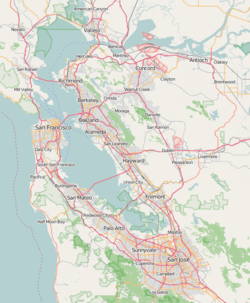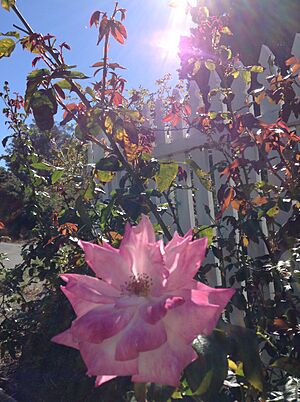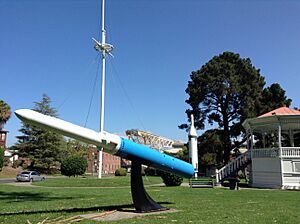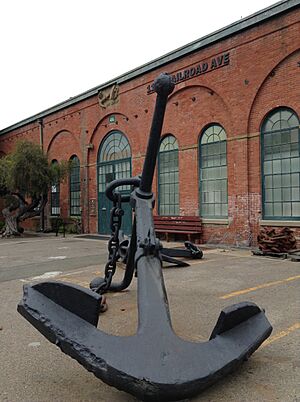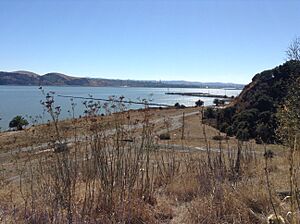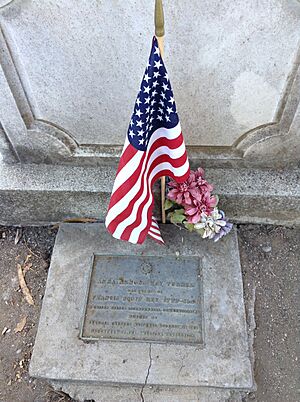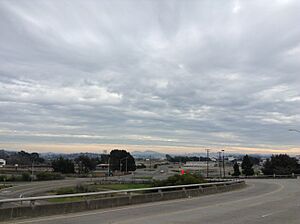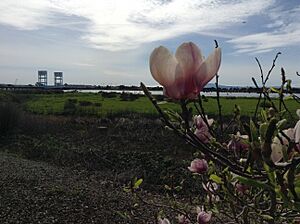Mare Island facts for kids
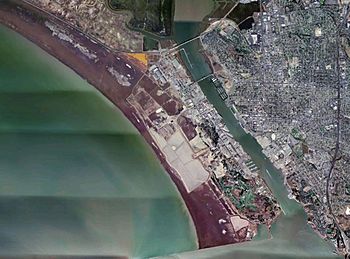
Aerial photo of the southern part of Mare Island
|
|
| Geography | |
|---|---|
| Location | Northern California |
| Coordinates | 38°05′43″N 122°16′41″W / 38.095254°N 122.278004°W |
| Adjacent bodies of water | San Francisco Bay |
| Administration | |
| State | |
| County | Solano |
| City | Vallejo |
Mare Island (which means Isle of the Mare in Spanish) is a piece of land that sticks out into the water, also known as a peninsula. It's located in the city of Vallejo, California, about 23 miles (37 km) northeast of San Francisco. The Napa River flows along its eastern side before joining the Carquinez Strait and San Pablo Bay.
Mare Island is the largest of several "islands" in the area that are actually peninsulas. This means they are connected to the mainland, not completely surrounded by water. Mare Island is about 3.5 miles (5.6 km) long and 1 mile (1.6 km) wide.
Contents
Discovering Mare Island's Past
Mare Island has a long and interesting history! In 1775, a Spanish explorer named Perez Ayala was the first European to visit the island. He called it Isla de la Plana.
How Mare Island Got Its Name
The island got its current name in a special way. In 1835, a ferry carrying people and animals across the Carquinez Strait got caught in a storm and tipped over. General Mariano Guadalupe Vallejo, an important Mexican leader in Northern California, was worried because his favorite white horse, a mare, was on the ferry.
A few days later, General Vallejo's mare was found safe on the island! She had swum ashore. To celebrate this lucky event, he renamed the island Isla de la Yegua, which is Spanish for Mare Island. This name has been used ever since.
Early Developments on the Island
In 1892, work began on the Mare Island Golf Club. This makes it the oldest golf course west of the Mississippi River!
For over 100 years, Mare Island was home to a very important U.S. Navy base called the Mare Island Naval Shipyard. This was the first permanent U.S. naval base on the west coast.
In 1850, after California became a state, President Millard Fillmore decided that Mare Island should be used by the government. In 1852, a Navy team looked for the best place for a naval yard on the Pacific Coast. They chose Mare Island because it was safe from ocean storms and floods.
The Navy bought Mare Island in July 1853. On September 16, 1854, Mare Island officially became a naval base. Commodore David Farragut was its first commander.
Growing the Shipyard
As the U.S. Navy grew, Mare Island also grew. In 1872, construction began on a large "drydock." A drydock is a special basin that can be drained of water, allowing workers to build or repair ships below the waterline. This first drydock was finished in 1891. A second one was built by 1910, and a third by 1941.
By 1941, Mare Island was a very busy place. It had new power plants, workshops, and buildings. It could repair and paint many large naval ships at once. A causeway (a raised road over water) was built to connect Mare Island to Vallejo, replacing an old ferry service.
Mare Island During World War II
Before World War II, Mare Island was always expanding. By 1941, it had grown a lot, with new piers and shipbuilding areas. At the start of 1939, about 5,593 people worked there. By May 1941, this number jumped to 18,500 workers! During World War II, the shipyard employed up to 50,000 workers, playing a huge role in supporting the war effort by building and repairing ships.
Training and Operations
In 1969, the Navy moved its river boat training from Coronado, California, to Mare Island. Here, sailors learned how to operate small boats like Swift Boats and PBRs for river warfare. Even after the base closed, the U.S. Navy Reserves still use the water areas for training.
Mare Island was also a place for important Navy technical training. Sailors learned skills like maintaining data systems, fire control, and communications.
The USS Guitarro Incident
The USS Guitarro (SSN-665), a type of submarine, was being built at Mare Island. On May 15, 1969, while still under construction and tied to the pier, the submarine accidentally filled with water and sank. This happened because of mistakes during testing. It took three days to raise the submarine and many months to fix it.
Bringing Mare Island Back to Life
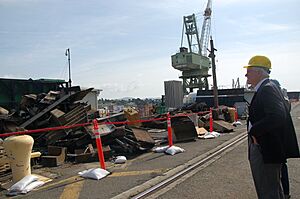
In 1993, the U.S. government decided to close Mare Island Naval Shipyard. This was a big change because the shipyard had been the main source of jobs for Vallejo for a long time. It employed 5,800 workers when it was ordered to close.
Planning for the Future
The city of Vallejo wanted to turn Mare Island into a lively place where people could live and work again. They created a plan in 1994, which was later updated. This plan decided how different parts of the island would be used.
Protecting History
Mare Island is very old and has many historic buildings. Because it was the first shipyard and naval facility on the West Coast, the government recognized it as a National Historic Landmark in 1975. California also listed it as a California Historical Landmark in 1979. In 1999, the city of Vallejo added Mare Island to the National Register of Historic Districts.
Before new development could happen, the city and government agencies also had to clean up the land. This involved removing toxic substances and cleaning the soil.
New Homes and Nature Areas
In 1998, a company called Lennar Mare Island LLC (LMI) began developing 650 acres (2.6 km²) of the island. The plan included different areas: a university district, an industrial zone, historic areas, and neighborhoods for homes.
A large part of the island (78%) was set aside for wildlife, wetlands, parks, and open spaces. In 2007, LMI finished building the first neighborhoods, like Farragut Village with 277 homes. The plan aims for a total of 1,400 homes and condos, plus millions of square feet for businesses, shops, and entertainment.
Residents asked to turn some old dredge ponds (areas that collected dirt and water) into wetlands instead. The city and the developer agreed. In 2006, the Mare Island Shoreline Heritage Preserve was created. This 215-acre (0.87 km²) area is now a public park.
In 2009, a company called Alstom moved its train maintenance facility to Mare Island.
Mare Island in Movies and TV
Mare Island has been a filming location for many movies and TV shows!
- In 1917, famous actors Charlie Chaplin and Douglas Fairbanks, along with boxer Jack Dempsey, made a silent film with soldiers on Mare Island.
- The 1943 war movie Destination Tokyo shows Mare Island's cranes and docks.
- Parts of the 1953 film Submarine Command were filmed on Mare Island.
- The cast and crew of the 2012 film The Master filmed on Mare Island for a month, using a hospital and an admiral's mansion.
- In the 1997 action film Metro, a character is told to bring stolen jewelry to Mare Island.
- The TV show Battlebots filmed its sixth season at the Mare Island Sports Center in 2015.
- Musician St. Vincent (musician) filmed her 2011 music video for "Cruel" around Mare Island.
- An old warehouse building, known as Building 1310, has been used for filming. From 2016 to 2019, it was used for the Netflix show 13 Reasons Why and the 2018 Transformers movie Bumblebee.
Getting Around Mare Island
You can reach Mare Island by State Route 37 and Interstate 80. There's also the Wichels Causeway, which has train tracks. The San Francisco Bay Ferry offers boat service between Mare Island, Vallejo, and San Francisco.
Mare Island is also home to Touro University California, a university, and the offices for the US Forest Service and the Vallejo City Unified School District.
Mare Island's Weather
Mare Island has a type of weather called a "warm-summer Mediterranean climate." This means it has warm, dry summers, but they are not extremely hot. The average monthly temperatures never go above 71.6°F (22°C).
Images for kids
-
Congressman George Miller on Mare Island in 2011.


